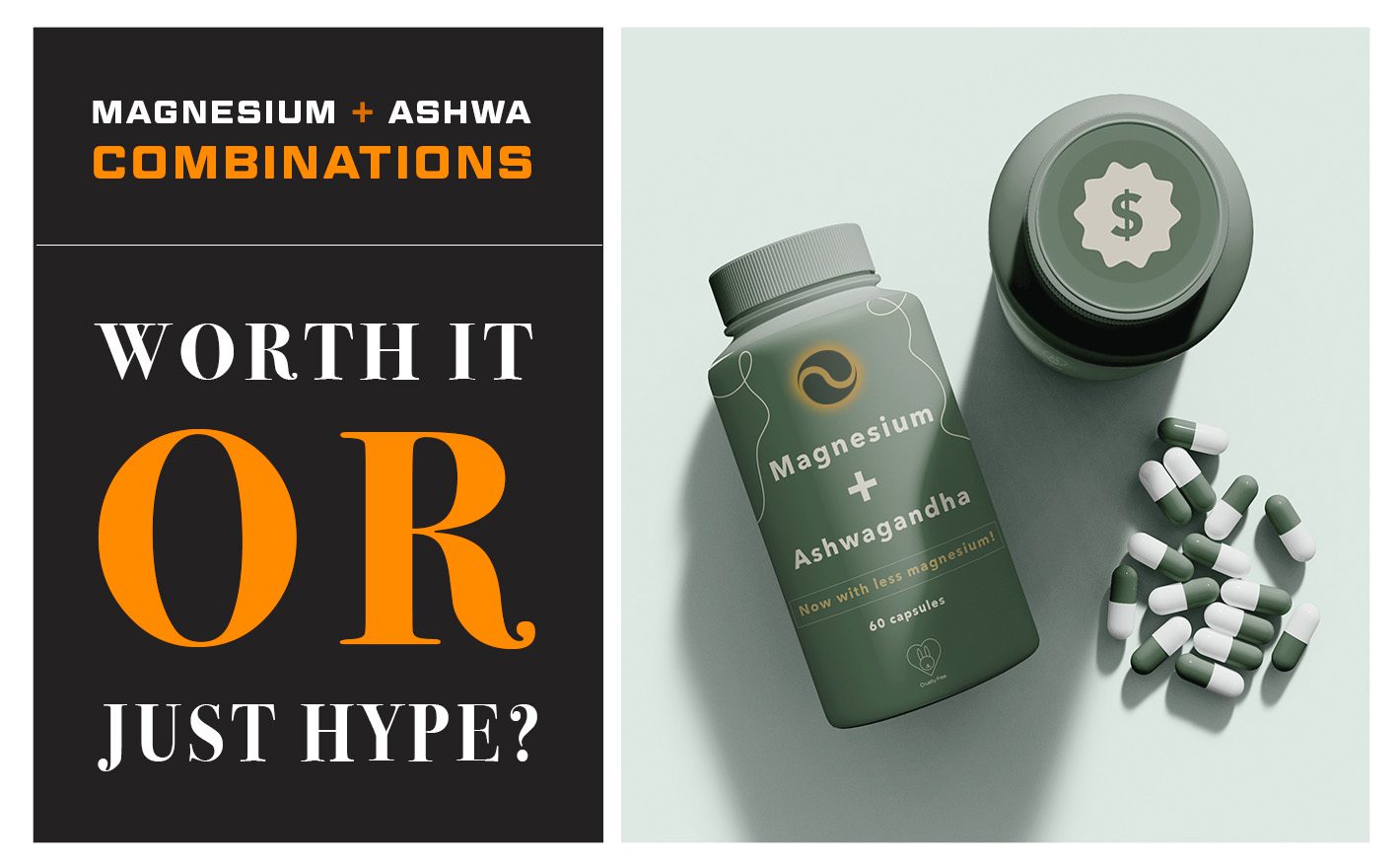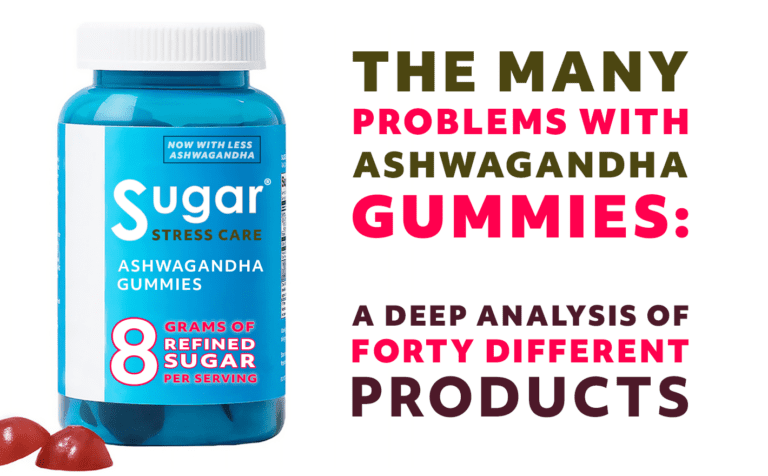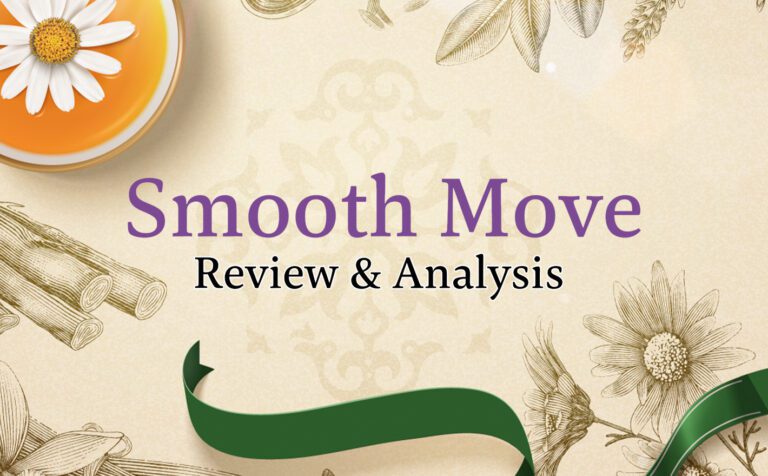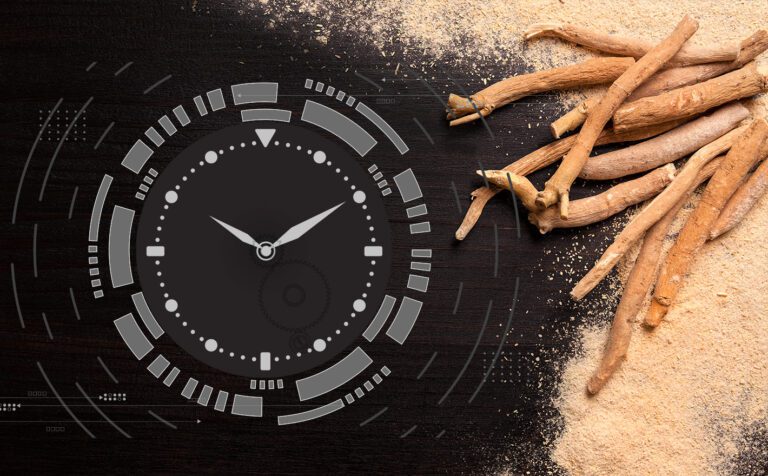More people are learning that Ashwagandha and magnesium are two of the most effective supplements to combat stress, enhance mood, and boost sleep quality.
Ashwagandha is one of the world’s most beloved herbs for a very good reason. Millions of people take it daily, relying on it to manage stress hormones and keep a level head.
Like Ashwagandha, magnesium is also an incredibly versatile supplement. It’s necessary for over 300 different chemical reactions in the body, including those that drive muscle relaxation and neurotransmitter production.
Alarmingly, over half of Americans don’t meet the recommended daily intake of this essential electrolyte, a testament to the epidemic prevalence of poor eating in the US.
Supplement companies have taken notice of these ingredients’ rising popularity, and begun to make products that combine both, but are they really worthwhile, or is it best to take them separately?
In this article, we’ll discuss the benefits of these supplements and also give an in-depth review of seven different Ashwagandha and magnesium combination products.
Here’s a list of the products we’ll be reviewing. You can click the links to go directly to each one.
- Nature’s Craft Ashwagandha and Magnesium
- Irwin Naturals Triple-Source Ashwagandha and Magnesium
- New Chapter Ashwagandha and Magnesium
- Nobi Nutrition Electrolyte Balance Ashwagandha and Magnesium
- Nature Made Calm & Relax
- Carlyle Magnesium Glycinate and Ashwagandha Complex
- GreenWave Nutrition AshwaMag
Can you take magnesium and Ashwagandha together?
Yes, you can take Ashwagandha with magnesium. Not only do these two not conflict with each other, but they actually work synergistically to support your health in a multitude of ways.
Here are some of the benefits they share, based on the current research:
- Sleep quality
- Blood sugar health
- Stress management
- Mood health
- Cardiovascular health (more for magnesium than Ashwagandha)
- Healthy inflammation response
- Healthy detoxification by promoting glutathione (this effect is subtle but documented)
Magnesium vs. Ashwagandha dosing
Finding your optimal dose of magnesium is more complex than with Ashwagandha.
Magnesium is an essential mineral, so your optimal dose depends on how much you get in your diet, whether you take prescriptions that deplete it, how much calcium you take, and various other factors.
Dosing Ashwagandha is slightly more of an art than a science, though research can shed light on what it can do and how long it takes to work, based on the dose.
The most important thing with Ashwagandha is to at least get enough of the herb to actually get some effects, and–as you’ll see–some of the products we reviewed had nowhere even close to the minimum effective dose, while most of the others still only use the bare minimum.
At CHOQ, we practice evidence-based dosing, meaning that we use amounts of each ingredient that have been demonstrated to achieve significant effects according to the available research. The extract in CHOQ Ashwagandha is not only clinically-researched for its beneficial effects on key areas such as mood, sleep, and hormone health (see references here), but also standardized to the highest levels of active compounds (withanolides) of any product on the market.
How to tell the difference between high and low-quality magnesium vs. Ashwagandha supplements
At CHOQ, we have incredibly stringent quality standards and go out of our way to give you the highest potency ingredients we can find, rather that cutting corners by using weak herbs or low-absorption nutrients.
Unfortunately, most supplement companies just care about the bottom line, and happily rely on the average person’s inability to tell a top-notch product from one that’s filled with junk. The following sections will arm you with the knowledge you need to shop intelligently.
What makes a quality Ashwagandha?
These are the most important questions to ask when selecting an Ashwagandha product:
- Is the dose provided actually within the active range?
- Is it just raw powder, or an extract?
- Has it been lab-analyzed to contain a certain percentage of withanolides?
- Is it generic, or is it a brand that has specific human clinical research behind it?
Most Ashwagandha products on Amazon are only standardized to contain 2.5% withanolides, but CHOQ Ashwagandha contains 35%, making it 14 times the potency of these generic extracts.
What makes a quality Magnesium?
Picking a good magnesium is a lot more challenging than most people think. There are nearly a dozen different molecular forms, all with different levels of absorption, primary effects, and side effects.
Here are some critical questions to ask when shopping for a good magnesium:
- Does it provide an adequate amount? Somewhere between 250 and 500 mg is considered an effective dose for most people.
- Is it in a molecular form that the body can easily use, such as magnesium glycinate or taurate, or is it in a cheap form that has poor bioavailability and causes intestinal upset, such as magnesium oxide?
- If the product contains multiple forms, what’s the reason? Is it to make the product better, or–as is the case with magnesium oxide–to make it cheaper?
What does ‘molecular form’ mean?
Like most minerals, magnesium has to be attached to another compound for your body to use it. Which compound a magnesium is bound to has a huge effect on how it works.
Some of the more common molecular forms are: magnesium oxide, citrate, glycinate, and taurate.
Several of the products we reviewed contain magnesium oxide, which is widely known as the worst of all forms of magnesium, with only 4% absorption. Companies like to use it because it’s dirt cheap and allows them to fit more magnesium into a smaller pill, giving the illusion of a higher potency product.
This form is against our quality standards, as we prohibit the use of minerals that are hard to absorb and cause unnecessary side effects like excessive loose stools.
Magnesium & Ashwagandha product reviews
Note that, while we’re not using a star rating or ordering these according to quality, we did start with arguably the lowest quality product and finished with what we believe to be the highest.
Spoiler alert: we’re not really big fans of any of them because of their generally low potency. Want to know why? Click here to skip directly to our conclusion.
Nature’s Craft Magnesium + Ashwagandha Review
INGREDIENT BREAKDOWN:
- Magnesium dose is the highest of all products reviewed at 500 mg, however the molecular forms are a mix of high and low bioavailability
- Ashwagandha is unextracted and not a clinically-researched brand
- Ashwagandha dosing is extremely low at 25 mg, and well under the minimum effective dose (which, for just a raw powder, would be closer to 2,000 mg)
- Controversial excipients include: polyvinyl alcohol, titanium dioxide, polyethylene glycol, and talc
CONCLUSION:
This product is basically just magnesium with a tiny, ineffective sprinkle of Ashwagandha. Based on the presence of magnesium oxide, ineffective dosing of Ashwagandha, and a variety of unnecessary, controversial excipients, we consider this the least effective, lowest quality product in our review by a long shot.
Irwin Naturals Triple-Source Magnesium + Ashwagandha Review
INGREDIENT BREAKDOWN:
- Low in Magnesium (only 150 mg), but the molecular forms are decent
- Brand of Ashwagandha is clinically researched and standardized for withanolides, but only meets the minimum effective dose of 125 mg (most studies on this brand use 250 mg or more)
- Contains additional beneficial ingredients such as Vitamin K2, D3, and others, but may not be necessary if you take other products that contain them
- Contains a controversial excipient: titanium dioxide
- Not suitable for vegetarians, as the capsule is made of gelatin
CONCLUSION:
Overall, this product is decent, and comes with some additional helpful ingredients, but the doses of both magnesium and Ashwagandha are lower than you will find in most standalone supplements.
New Chapter Magnesium + Ashwagandha Review
INGREDIENT BREAKDOWN:
- Magnesium dose is good (325 mg), however the molecular forms are a mix of high and low bioavailability
- Brand of Ashwagandha is clinically researched, but the dose is extremely low at only 25 mg, which is only 1/6 of the the minimum effective dose
CONCLUSION:
Some of the magnesium in this product is coming from the oxide form, which–as already mentioned–is cheap and has notoriously low absorption.
Similar to the first product on the list, this is basically a magnesium product with a tiny amount of Ashwagandha added to it that’s unlikely to have any significant effects.
The brand of Ashwagandha used is one of the highest quality available and has plenty of science to back it up, however the company that produced it has never studied it below 150 mg, which is 6 times the amount present in one serving. Most of their studies used at least 250 mg.
Just to give you a relative sense of dosing: before we upgraded our Ashwagandha, we used to use the exact same version that’s in this product, but we used 24 times the amount per serving (600 mg).
Nobi Nutrition Electrolyte Balance Magnesium + Ashwagandha Review
INGREDIENT BREAKDOWN:
- Magnesium dose is excellent at 400 mg, but like many of the other products, contains subpar molecular forms
- Ashwagandha dose is in the effective range at 500 mg, but withanolide count is lower than many competing products (only 1.5%)
CONCLUSION:
We appreciate the fact that Nobi Nutrition at least chose to provide adequate doses of both ingredients, despite the use of magnesium oxide. Given the low cost, this may be a cost-effective product to consider if you don’t mind getting lower absorption forms of magnesium.
Nature Made Calm & Relax Review
INGREDIENT BREAKDOWN:
- Magnesium dose is decent at 300 mg, but molecular form is lowest in bioavailability
- Brand of Ashwagandha is clinically researched and standardized for withanolides, but only meets the minimum effective dose of 125 mg
CONCLUSION:
Unlike other products that use a combination of a higher and lower absorption form of magnesium, this one exclusively uses magnesium oxide. While 125 mg of this kind of Ashwagandha has been shown to be beneficial, it’s also the minimum effective dose.
Carlyle Magnesium Glycinate + Ashwagandha Complex Review
INGREDIENT BREAKDOWN:
- Magnesium is in a preferred molecular form (glycinate), but it only contains 150 mg per serving
- Ashwagandha dose is on the low end (150 mg of at 10:1 extract), and not standardized for withanolides
CONCLUSION:
This product contains the smallest amount of magnesium found in any of the products we reviewed (tied with the Irwin Naturals product), and the quantity and kind of Ashwagandha is on the lower end, though likely to produce some benefits.
GreenWave Nutrition AshwaMag Review
INGREDIENT BREAKDOWN:
- Magnesium is exclusively in the preferred glycinate form, but on the lower end at only 248 mg
- Ashwagandha is both organic and from a clinically-researched brand, dosed at an amount likely to produce benefits based on the studies (250 mg)
- Also contains L-Theanine and Vitamin B6, both ingredients that can support mood health
CONCLUSION:
In terms of quality, this would be our top choice.
However, coming in at over 10 times the price per serving as the cheapest product on this list, this product is extremely expensive. Part of this is due to the addition of the other ingredients, which could either be helpful or unnecessary, depending on your individual needs.
You could easily get a far larger dose of the same kind of Ashwagandha and Magnesium by taking them separately.
Final Conclusion: are any of these products worth it?
No, not really.
Nearly all of these products were underdosed, and 4 out of 7 of them used magnesium oxide. Even the one that has the most Ashwagandha, AshwaMag by GreenWave Nutrition, still only contains 250 mg of extract.
To be clear, this is an effective dose–based on the research behind the specific extract in that product–but given the extremely high price, it should contain more Ashwagandha.
Here’s how the Ashwagandha in the most potent product in our review compares to CHOQ Ashwagandha:
- AshwaMag has about 25 mg of withanolides per serving (250 mg of Sensoril®, an Ashwagandha that’s standardized to 10%)
- CHOQ Ashwagandha has 105 mg of withanolides per serving (300 mg of an extract that’s standardized to 35%)
- Thus, our product is still over 4x the potency of the strongest product we reviewed, and that’s all in just one pill per day.
Our final conclusion is that you’re better off taking these supplements separately. There are plenty of great Magnesium Glycinate and Taurate supplements available online at reasonable prices.
These higher quality magnesium products will often give you around 200 mg per tablet. If you do a little math, you’ll quickly find that you can get far higher doses of both magnesium and Ashwagandha by simply buying them separately… and you still only have to take 3 pills per day.
For the best possible outcome, we recommend taking CHOQ Ashwagandha with your choice of a high absorption magnesium. Get 20% of your subscription of CHOQ Ashwagandha (for life) and experience better mood, energy, and hormone health at a significant discount.
Use code ‘ASHWA2024’ to save on the most potent Ashwagandha on the market now!
Also, if you’d like to learn more about adaptogens like Ashwagandha, Shilajit, and Tongkat Ali, you might love these articles:





